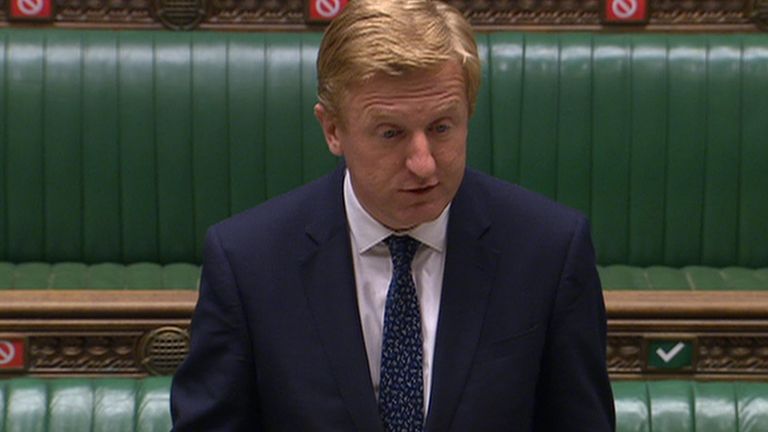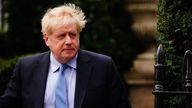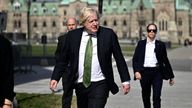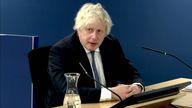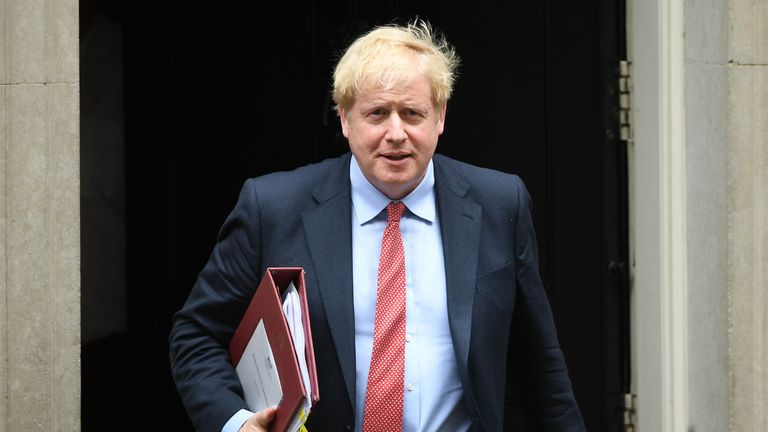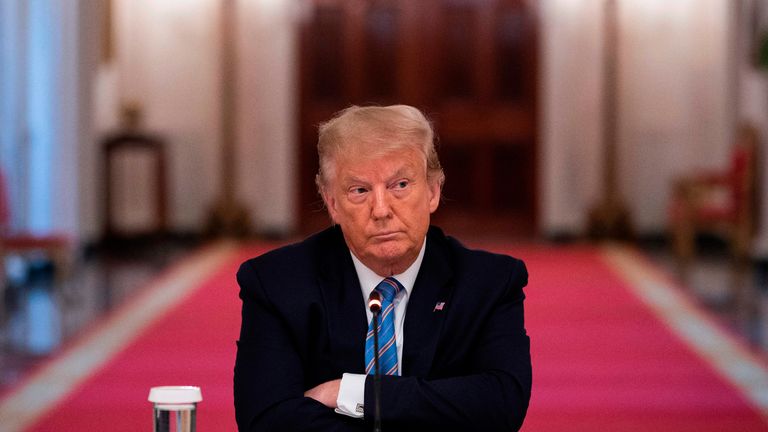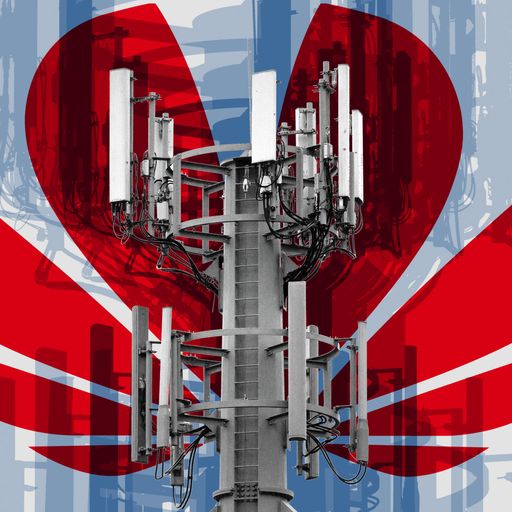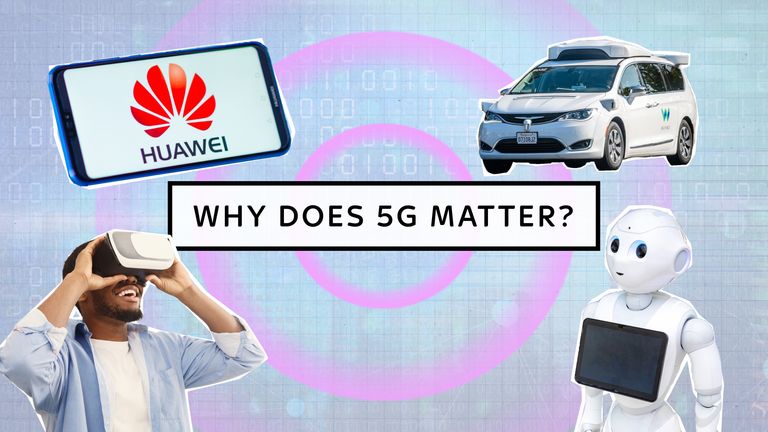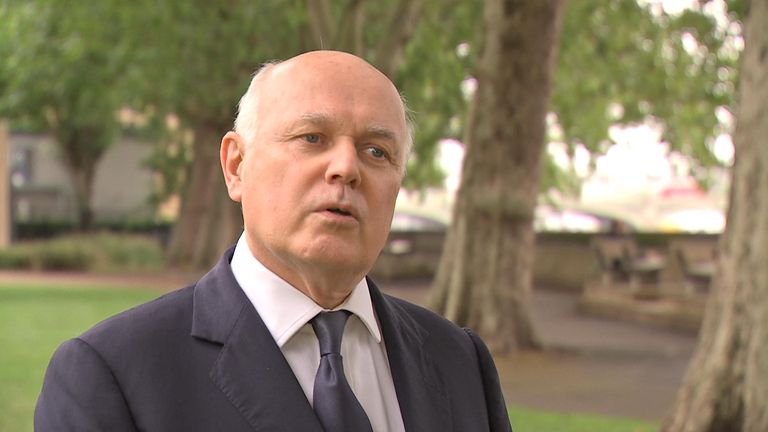Huawei blocked: Tech must be stripped from UK's 5G network by 2027
The government admits the move will delay the roll-out of 5G in the UK by two to three years and increase costs by up to £2bn.
Wednesday 15 July 2020 05:04, UK
Boris Johnson has ordered all Huawei technology to be stripped out of the UK's 5G network by 2027.
In a major U-turn, the prime minister also banned the purchase of any new 5G equipment from the Chinese tech giant from the end of this year.
The government acknowledged the move would delay the roll-out of 5G in the UK by two to three years and increase costs by up to £2bn.
Acting on the advice of the National Cyber Security Centre (NCSC), Mr Johnson has accepted new US sanctions on Huawei are a "game changer" in relation to the impact of the firm's technology on the UK's national security.
Downing Street had previously allowed Huawei to have a role in the UK's 5G infrastructure - a decision that came little more than six months ago.
Mr Johnson and senior ministers agreed to the removal of Huawei technology within the next seven years at a meeting of the National Security Council (NSC) in Downing Street on Tuesday morning.
Sky News's defence and security correspondent Alistair Bunkall said there were some "tense exchanges" during the NSC meeting.
An existing ban on Huawei's involvement in the most sensitive parts of the UK's 5G networks - announced in January when the prime minister previously gave the go-ahead for the firm to build mobile infrastructure - remains in place.
:: Listen to the Daily podcast on Apple Podcasts, Google Podcasts, Spotify, Spreaker
Culture Secretary Oliver Dowden confirmed Tuesday's further action on Huawei in a statement to the House of Commons, as he announced the measures would be put into law by a forthcoming Telecoms Security Bill.
He told MPs: "By the time of the next election we will have implemented in law an irreversible path for the complete removal of Huawei equipment from our 5G networks.
"We have not taken this decision lightly and I must be frank about the decision's consequences for every constituency in this country; this will delay our roll-out of 5G."
Mr Dowden said the measures introduced both in January and on Tuesday would cause a cumulative delay to the roll-out of 5G in the UK of two to three years and increase costs by up to £2bn.
Critics have long alleged Huawei has close links to the Chinese government and its equipment could be used for espionage purposes - something the company has always denied.
Huawei describes itself as a private company "fully owned by its employees".
In January, Mr Johnson confirmed Huawei would be able to build "non-core" parts of the UK's 5G network, but with a series of conditions attached to the company's involvement.
This included capping Huawei's market share at 35% and blocking it from involvement in the most sensitive areas of the network.
The prime minister's decision angered US President Donald Trump - who was reported to have been "apoplectic" with Mr Johnson in a telephone call.
In May, the US placed more sanctions on Huawei to block the firm from using computer chips based on American designs in any of its equipment.
This led to fears the company could begin to use "untrusted" replacement technologies - and prompted the NCSC's review of January's decision.
They are understood to have concluded there were no alternative products on the market for which the UK could have confidence in.
:: Listen to The World Tomorrow on Apple podcasts, Spotify, and Spreaker
The NCSC had "significantly changed their security assessment" of Huawei's presence in the UK's 5G network in the wake of the US sanctions, Mr Dowden told MPs.
He added: "Given the uncertainty that this creates around Huawei's supply chain, the UK can no longer be confident it will be able to guarantee the security of future Huawei 5G equipment affected by the change in US foreign direct-product rules."
Chi Onwurah, Labour's shadow digital, science and technology minister, branded the government's approach "incomprehensibly negligent".
She told MPs: "It has been clear for some time that there are serious questions over whether Huawei should be allowed to control large sections of our country's telecoms networks, yet the government refused to face reality.
"Their approach to our 5G capability, Huawei and our national security has been incomprehensibly negligent."
Responding to the government's announcement, Huawei UK spokesperson Ed Brewster said: "This disappointing decision is bad news for anyone in the UK with a mobile phone.
"It threatens to move Britain into the digital slow lane, push up bills and deepen the digital divide.
"Instead of 'levelling up' the government is levelling down and we urge them to reconsider.
"We remain confident that the new US restrictions would not have affected the resilience or security of the products we supply to the UK.
"Regrettably our future in the UK has become politicised, this is about US trade policy and not security."
Mr Brewster said Huawei would conduct a "detailed review" of what Tuesday's decision means for the firm's involvement in the UK.
Michael Pompeo, the US secretary of state, welcomed the news.
"With this decision, the UK joins a growing list of countries from around the world that are standing up for their national security by prohibiting the use of untrusted, high-risk vendors," he said in a statement.
"We will continue to work with our British friends on fostering a secure and vibrant 5G ecosystem, which is critical to transatlantic security and prosperity...
"Countries need to be able to trust that 5G equipment and software will not threaten national security, economic security, privacy, intellectual property, or human rights."
In recent months, an increasing number of Conservative MPs had spoken out about Huawei's involvement in the UK, which piled pressure on Mr Johnson to reverse January's decision.
Dissent on the Tory benches in the House of Commons had also grown amid wider concerns about China, including Beijing's response to the coronavirus pandemic, its imposition of a new security law on Hong Kong, and its treatment of Uighur Muslims in detention camps.
In March, 38 Tory MPs rebelled against the government in a Commons vote over Huawei's 5G role.
On Tuesday morning, ahead of the NSC meeting, former Conservative leader Sir Iain Duncan Smith told Sky News that "you can't separate" Chinese firms and the Chinese government.
"Across the free world, more and more countries are now recognising that they face a particular threat now from Chinese government intentions," he said.
Following the government's announcement, Sir Iain later said the UK could strip out Huawei technology from 5G infrastructure sooner than 2027 and called for the deadline to be shortened to five years.
Tom Tugendhat, who chairs the Commons' Foreign Affairs committee and the China Research Group of Tory MPs, hailed "a major victory for parliament".
"Huawei's position in the UK's phone networks is now in reverse and our future prosperity will not be tied to a company linked to [the] Chinese state," he said.
"There's no point in taking back control from Brussels only to hand it over to Beijing."
However, Mr Tugendhat called for "more details" and "more speed" on the government's action.

